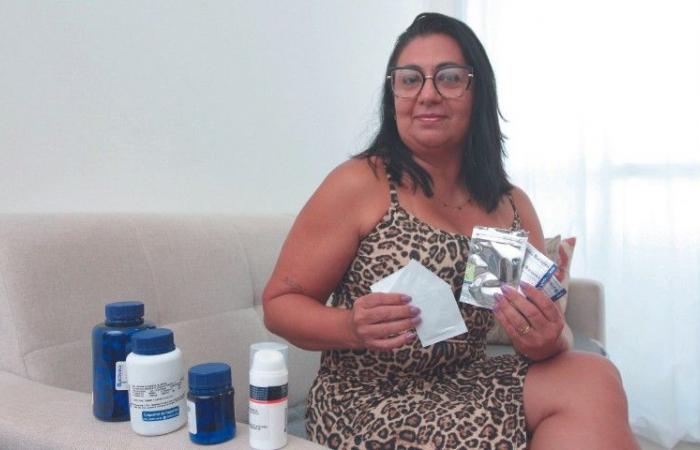srcset=”https://cdn2.tribunaonline.com.br/img/inline/170000/372×236/So-52-das-mulheres-fazem-tratamento-para-menopausa0017442900202404021335/ScaleUpProportional-1.webp?fallback=%2Fimg% 2Finline%2F170000%2FSo-52-das-mulheres-do-treatment-for-menopause0017442900202404021335.jpg%3Fxid%3D770497&xid=770497 600w,
A study published in the scientific journal Climateric showed that Brazilian women enter menopause when they are, on average, 48 years old, and that 73.1% of them have unpleasant symptoms, such as hot flashes, in the period between pre-menopause and menopause. menopause and when they finally stop menstruating.
After menopause, these symptoms exist in 78.4% of women.
The research also showed that, even with unwanted symptoms, only 52% of them undergo some type of treatment to avoid them. Of those who are treated, 22% take hormone replacement therapy. The rest use other types of care, such as yoga, acupuncture and the use of antidepressants.
Georgia Maciel da Silva Brito, gynecologist and obstetrician, commented on possible reasons for this low demand for treatments.
“Although we currently live in a digital era, many do not have access to quality information and are therefore unable to search for and find a professional,” he said.
“Many also understand that, because it is a period, it would be a mandatory process that they have to go through, but that is not true. There are treatments that help guarantee a better quality of life”, added the doctor.
Gynecologist and menopause specialist Mariana Andreata explained that, in addition to hot flushes, which are hot flashes, other common symptoms that appear are: insomnia, irritability, loss of libido and vaginal dryness.
“Generally, they begin during the climacteric period, which is where the woman begins to have an ovary that does not have the capacity to produce enough hormones (estrogen and progesterone). Then, they worsen and at the time of menopause they become very severe.”
She said that even after menopause occurs, due to the lack of hormones, these symptoms can continue for more than ten years, and there is also a clinical repercussion on the female body, such as an increased risk of cardiovascular diseases, increased risk of dementia, osteoporosis and increased abdominal fat. Therefore, medical monitoring is essential.
Regarding what to do to treat menopausal problems, gynecologist Ronney Guimarães gave some options. “We always suggest lifestyle changes with physical activity, healthy eating and acupuncture,” he said.
“The main treatment is to identify what the patient’s symptoms are and treat what she complains about. Some symptoms are more related to a decrease in estrogen, such as hot flashes. Then there is estrogen hormone therapy. In others, there is a complaint of reduced libido, so we do hormonal therapy by prescribing progesterone,” she concluded.
It is worth highlighting, according to doctors, that not all women can take this type of hormone therapy.
Stay in
Regular consultation with a gynecologist
– The study
It outlined the Brazilian profile of menopause and was published in the scientific journal Climateric.
It was carried out by researchers from the Faculty of Medicine of Jundiaí, Faculty of Medicine of ABC, Faculty of Medicine of the University of São Paulo (USP) and the University of Pavia, in Italy.
In total, the scholars interviewed 1,500 women, aged between 45 and 65, to obtain the basis for their work.
– Data
Brazilian women enter menopause when they are, on average, 48 years old.
The onset of transition and menstrual irregularity begins at 46 years of age.
73.1% of women experience unpleasant symptoms, such as hot flushes (hot flashes) in the period between pre-menopause and menopause. After menopause, symptoms affect 78.4% of women.
Only 52% of them receive some type of treatment, with the majority who sought care being those from higher social classes.
Of those who are treated, only 22% take hormone replacement therapy. The others opt for alternative therapies and the use of antidepressants, the study points out.
Women who undergo hormone therapy treatment abandon care within a short period of time, around eight months after starting treatment. Side effects are part of the reasons for this withdrawal.
– Understand
The transition period from a woman’s reproductive to non-reproductive period is called climacteric.
This process has a variable duration between patients, and unpleasant symptoms are present due to the hormonal decline that occurs in the female body. The most common are hot flashes, insomnia, irritability, loss of libido and vaginal dryness.
Symptoms appear during menopause and last up to 10 years after a woman has entered menopause, which is the name given to the last menstruation, marking the end of the reproductive phase of a woman’s life.
It is confirmed by the absence of menstruation for a period of 12 consecutive months.
In addition to the common symptoms, it is worth highlighting that, due to the drop in estrogen and progesterone hormones, women are at greater risk of developing cardiovascular diseases, an increased risk of dementia, osteoporosis and abdominal fat. Regular consultation with a gynecologist, therefore, is essential.
According to gynecologist and menopause specialist Mariana Andreata, women have entered menopause earlier and this is attributed to their lifestyle: with a lot of stress, industrialized diet, sedentary lifestyle and obesity.
– Symptoms and treatment
A recommended treatment to improve the patient’s quality of life is hormone replacement therapy. However, not everyone can do it.
The contraindications of this action are focused on: personal history of gynecological cancer or some hormone-dependent cancers; history of a first-degree relative with breast or ovarian cancer with a genetic factor; history of thrombosis; smoking; serious liver diseases; etc.
For those who cannot undergo hormone treatment, it is important to continue with lifestyle changes and behavioral measures associated with healthy eating.
Source: Doctors consulted and AT research.
RELATED TOPICS:
HEALTH
Understand symptoms, warning signs and treatments available for dengue fever
HEALTH
Brazilian children are taller and more obese, study reveals
HEALTH
Brazil begins to adopt a single dose regimen against HPV






